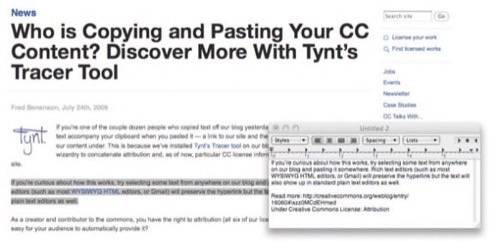Earlier this morning we reported on the AP’s new content tracking system and already we’re seeing the blogosphere light up with cries of nefarious intent. Nevertheless, just to prove that content tracking may not always be about serving DMCA take down notices, Creative Commons featured the Tynt Tracer tool in a morning blog post.

Tynt Tracer is a few lines of JavaScript that automatically add license and attribution information to a user’s clipboard when they copy text. This method of attribution is not mandatory, nor is it really enforceable as re-posters can always remove the 3 lines of code. Nevertheless, this tool certainly makes attribution convenient.
As an additional plus, Tracer adds, “Our data shows that those pages that users engage with most are not necessarily those with the most page views.” With Tracer, publishers can find out their most sought after information and increase the relevancy of their resources to readers. Creative Commons is already using Tracer to see what readers are highlighting, copying and redistributing.

As well, Creative Commons’ Fred Benenson encourages members to consider using the tool. He says, “As a creator and contributor to the commons, you have the right to attribution (all six of our licenses require it), so why not make it easy for your audience to automatically provide it?”
To test Tracer, members can register at Tynt.
Read more:
http://creativecommons.org/weblog/entry/16060#ixzz0MCiF2lSE
Under Creative Commons License: Attribution
http://tracer.tynt.com/features-and-benefits-of-tracer#ixzz0MCg9SuUl
Under Creative Commons License: Attribution No Derivatives

















